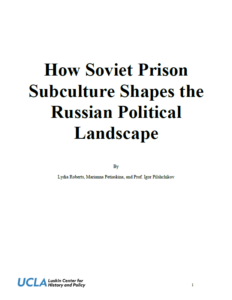How Soviet Prison Subculture Shapes the Russian Political Landscape
This project explores the enduring influence of Soviet-era prison culture on contemporary Russian society and politics. Through interdisciplinary collaboration among academics, activists, and policymakers, this research underscores how criminal subculture, rooted in Soviet prisons, continues to shape public attitudes, political discourse, and societal behaviors in Russia today. The report delves into the evolution of this mindset from its origins in Soviet prison culture, tracing its influence on post-Soviet Russian culture and politics. The study draws on various writings by former prisoners and other historical sources to illustrate how this subculture has become deeply embedded in Russian society. Key findings of the research highlight the integration of criminal jargon and practices into Russian public discourse and the political sphere, particularly under President Vladimir Putin. His use of criminal slang and emphasis on living “by concepts” resonates deeply with the Russian populace, reinforcing authoritarian tendencies and complicating international relations. A nuanced understanding of these cultural and historical factors is crucial for analyzing Russia’s current and future societal and political developments.
This research was conducted by UCLA graduate students Lydia Roberts and Marianna Petiaskina, with guidance from UCLA Professor Igor Pilshchikov.
Read the full report [here].



